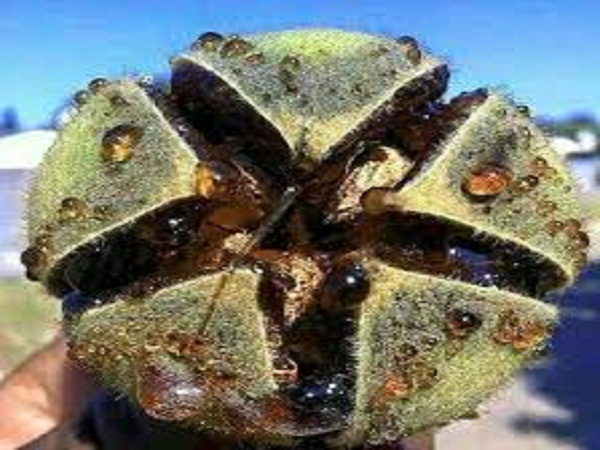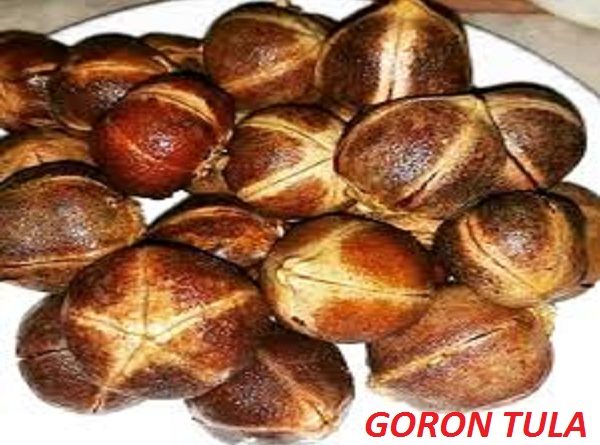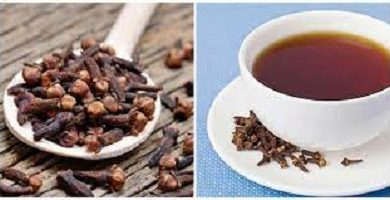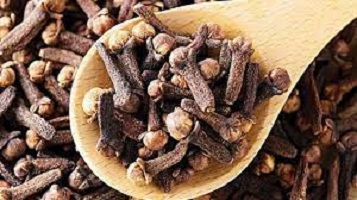GoronTula Fertility Fruit: 15 Health Benefits
Please, check out this video for a better understanding of what GoronTula is all about before we start
Gorontula fruit (Hausa) is sometimes referred to as Thespesia or Silky Kola. It is also known as tree hibiscus and snot apple in English. There is no Yoruba name for it at the moment.
Botanically identified as Azania garckeana, Goron Tula origin in Nigeria is in Tula Kaltungo Local Government of Gombe State and Michika of Adamawa State.
The Goron Tula Powder is sold in local markets in some African countries, for instance, Nigeria, Kenya, Botswana (Morojwa), Tanzania, Zambia, and Zimbabwe (Mutohwe).
Please Read: Aju Mbaise for Fertility, Tummy Fat Burner & Weight Loss
GoronTula Fertility Fruit benefits
Besides the fruit, the tree provides fodder for animals, timber for firewood, shade; and soil conservation.
Also, the bark and roots are used for health purposes, as are the Goron Tula pulp and Goron Tula seed.
The African snot apple is tested and trusted. Although there were books and research on Azanza Garckeana, nobody ever took them seriously.
Hauwa @jaaruma_empire of www.gorontula.com brought Goron Tula to the limelight and made it what it is today in Nigeria and Africa as a whole.
She studied Azanza Garckeana for years and sent it out for trials in 36 states before finally releasing it formally to the general public.
Daily Trust also quoted a nutritionist, Miss Chidera Ezenwafor, as saying that Goron Tula is a miracle seed.
The nutritionist said the fruit could also assist in improving bowel movement and easing digestion.
Above all, sohealthyng.com brought this indigenous fruit to the limelight in their article: https://sohealthyng.com/2019/05/23/11-health-benefits-of-goron-tula/
The potential of Azanza garckeana fruit benefits cannot be overemphasized.
The Goron Tula nut is mainly famous for curing fertility problems, both for men and women.

Goron Tula and Fertility
African snot apple seeds have long been known for their aphrodisiac properties. Aphrodisiacs are foods that stimulate sexual desire, pleasure, or performance.
Azanza fruit is rarely discussed; it is certainly not as common as other fruits like pineapple or Watermelon. But my, oh my, this fruit is so unique and I call it God’s Gift to Women!
Health Benefits of Goron Tula Seeds and Powder | Goron Tula Benefits | Uses
- Firstly, it increases the female libido and improves the sperm quality of men!
- Secondly, it helps in the production of juicy, copious amounts of vaginal wetness, perfect for those with dry vaginas.
- Helps in increasing the breast size
- Goron Tula and Pregnancy: It is also used for the treatment of Fibroid
- Thirdly, it aids in making the vigina walls clean due to lubrication.
- Fourthly and most importantly, since it aids fertility, it is superb for those trying to conceive.
- Also, it is great for women who have menstruation problems.
- Finally, it is perfect for cleansing the vagina and while doing so, it stops the bad viginal odor.
There is nothing to lose by adding this wonder fruit to your diet, as it has other good effects on your body, which include:
- Prevent high blood pressure
- Cleanse your body system
- Prevent liver problems
- Cancer prevention
- Boost bowel movement
- Improved immune system
- Lowers blood sugar (for diabetes patients)
- Causes chest pains
- Good for weight loss
- Goron Tula and hormonal imbalance: irregular cycles may point to a subtle hormonal imbalance.
How to Use Goron Tula Seed

Goron Tula seed uses include:
- Firstly, silky kola is a fruit that has sections and can easily be riven.
- Secondly, it produces a gummy liquid that you can cook, soak in water, or use as honey before eating.
- Lastly, you can consume it raw or juice it.
How to Eat Goron Tula
- First, you can break the seed and chew it like gum.
- Similarly, you can eat the fruit raw when it ripens.
- Besides, you can mix the powder with pap, tea, and yogurt.
- You can soak the dry snot apple in water or honey to make jelly or eat it like that
- Another method of consuming silky kola is by boiling it and relishing it in porridge
- Finally, you can mix it with other herbs to give a perfect result, like Kayan Mata: Goron Tula horny liquid
How to Extract Goron Tula Syrup/Juice: Recipe
- Firstly, wash the dry seed, eat the whole thing while sucking the juice, and then throw away the shaft.
- Secondly, you can soak a few seeds in hot water, sieve when cool, and drink the juice or use the juice in making smoothies
Side Effects
Like many herbal plants, Azanza garckeana has many medicinal uses and some after-effects. The side effects can include:
- Cancer
Too much consumption can predispose you to cancer because it contains tannins. Tannic acids are water-soluble polyphenols that are present in many plant foods.
- Adverse Reaction
Fruits that are high in polyphenols as part of a healthy diet are harmless for most people.
However, people with medical conditions or certain food allergies may need to avoid certain polyphenol-rich foods, like Azania garckeana.
Even though polyphenols have many benefits, excessive usage may have adverse effects.
How Nutritious Is Snot Apple?
Tula kola nut has many uses. It is rich in anti-fungal, anti-bacterial, anti-oxidant, anti-malarial, anti-hyperglycemic, and absorbing iron. This wonder fruit has great effects on your health with little or no side effects.
What Is the Work of the Azania garckeana Plant?
Silky kola is one of the most potent and super-fast aphrodisiacs. It treats a lot of diseases but the most common is fertility.
What is African chewing gum?
Tula kola nut will give you a glutinous sensation when you chew it directly. Because it is chewy and sweet, you can also call it “African Chewing Gum” fruit.
Is Goron Tula beneficial to fertility? Is GoronTula good for fertility?
Researchers believe that gorontula can be used as a fertility enhancer, reducing the need for synthetic drugs as fertility enhancers.
According to a study published in the Journal of Biology, Agriculture, and Healthcare, fruit should be encouraged.
How does GoronTula help with fertility?
Start chewing it a few days before your ovulation window.
This ensures that your body is cleansed before ovulation and that any free radicals that may interfere with conception are removed.
Eating Goron Tula before ovulation improves cervical mucus, which aids male fluid movement.
How much Goron Tula should I take daily?
After extracting the seed, you chew the flesh of the fruit raw. You have the option of taking two pieces every day.
How long does it take for GoronTula to work?
Most importantly, your body takes time to absorb nutrients from food.
After eating the fruit, this process could take between 3 and 6 hours.
As a result, we recommend that you take GoronTula at least 3 hours before the time you expect it to have an effect.
Is Goron Tula effective for hormonal imbalances?
Can Goron Tula be used to treat hormonal imbalances? It certainly does.
Goron Tula is an aphrodisiac and fertility enhancer for both men and women.
Can a man use GoronTula?
According to a 2011 study, lead poisoning has been shown to reduce a man’s fertility.
As a result, a man can use Goron Tula to treat erectile dysfunction issues that may be due to lead poisoning or high blood sugar levels.
Can a nursing mother take GoronTula?
Yes, please. However, it’s advisable to take it in small quantity
What is the English name for Gorontula?
Snot apple
Called tree hibiscus, Azanza, snot apple in the English language, goron Tula as it is called in Hausa is found in the northern part of Nigeria. It is sweet and chewy as well hence why it is also called “African Chewing Gum” fruit.
How should I use gorontula?
The most basic way to consume Gorontula is to chew it when it is ripe; they are chewed like gum and it produces a sweet taste.
After removing the seed, you can chew the flesh of the raw fruit.
In addition, the fruits can be soaked in a small amount of water to make jelly.
Is it safe to eat gorontula raw?
You can also chew the fruits raw after removing the seed.
To make jelly, soak GoronTula fruits in a small amount of water.
You can also boil the fruits and make porridge out of them.
How do you use the gorontula for Kayanmata? How to Eat GoronTula for Kayanmata
- Firstly, break the shell and eat the meat inside like chewing gum for fresh seeds.
- Secondly, GoronTula powder can also be used in tea beverages, pap, and also mixed with yogurt.
- Lastly, it can be boiled and made into syrup for the usual kayan mata.
How do I prepare gorontula? Process
- Firstly, wash Tula fruit in clean cold water (the water you drink)
- Then, open the fruit up remove the seeds, and wash the inner part to remove mold if it is there.
- Thirdly, pour drinking water into a kettle, and then place it on fire and allow it to a boiling point.
- After that, pour the water into a bowl and add the pulp or flesh to the warm water.
- Lastly, remove the pulp and dry it. At this point, the GoronTula is ready for consumption. You will notice that the fruit has become slimy and soft
How do you eat a Gorontula?
The flesh is sweet, and you can chew it for a while. This is one of the reasons it is also known as African chewing gum.
Chew it until there is no more juice coming from it and then discard the chaff.
Where to buy GoronTula Fruit/Snot apple – Azanza garckeana for sale?
You can buy African snot apples online or from local markets near you in Northern Nigeria. I have seen it at Ikorodu local market in Lagos, Port Harcourt, and Abuja too. It is also in Ghana and the price is quite affordable.
Health Benefits of Goron Tula
Goron Tula, also known as “African Velvet Tamarind” or “Snot Apple,” is a fruit native to West Africa. It’s highly regarded for its various health benefits, including:
Nutrient-rich: Goron Tula is packed with essential nutrients such as vitamins (particularly vitamin C), minerals like iron and potassium, and dietary fiber.
Boosts Immunity: Its high vitamin C content makes it beneficial for supporting the immune system, and helping the body fight off infections and illnesses.
Improves Digestive Health: The fiber content in Goron Tula aids in digestion and helps prevent constipation. It also supports a healthy gut microbiome, promoting overall digestive health.
Source of Antioxidants: Antioxidants in Goron Tula help neutralize harmful free radicals in the body, reducing oxidative stress and lowering the risk of chronic diseases like heart disease and cancer.
Potential Aphrodisiac: In traditional medicine, Goron Tula is believed to have aphrodisiac properties, enhancing libido and sexual performance. However, scientific evidence supporting this claim is limited.
Rich in Iron: Goron Tula is a good source of iron, which is essential for the production of red blood cells and the prevention of anemia.
Regulates Blood Sugar Levels: Some studies suggest that Goron Tula may help regulate blood sugar levels, making it potentially beneficial for individuals with diabetes or those at risk of developing the condition.
Supports Skin Health: The vitamin C and antioxidants in Goron Tula contribute to healthy skin by promoting collagen production, which helps maintain skin elasticity and prevent premature aging.
Boosts Energy Levels: The combination of nutrients in Goron Tula, including carbohydrates and iron, can help boost energy levels and combat fatigue.
Anti-inflammatory Properties: Goron Tula contains compounds with anti-inflammatory properties, which may help reduce inflammation in the body and alleviate symptoms of inflammatory conditions like arthritis.
Overall, Goron Tula is a nutritious fruit with several potential health benefits, but more research is needed to fully understand its effects and mechanisms of action. As with any food or supplement, it’s essential to consume Goron Tula as part of a balanced diet for optimal health benefits.
Goron Tula and Fertility
Goron Tula, also known as “African Velvet Tamarind,” has been traditionally believed to have aphrodisiac properties and is sometimes associated with fertility in certain cultures. However, scientific evidence specifically linking Goron Tula to fertility is limited, and more research is needed to substantiate these claims.
That said, Goron Tula does contain various nutrients that could indirectly support reproductive health and potentially aid fertility:
Vitamins and Minerals: Goron Tula is rich in vitamins and minerals like vitamin C, iron, and potassium, which are essential for overall health, including reproductive health.
Antioxidants: Antioxidants found in Goron Tula may help reduce oxidative stress and inflammation in the body, which can have a positive impact on fertility by supporting reproductive organ function.
Hormonal Balance: Some traditional medicinal practices suggest that Goron Tula can help balance hormones, which could potentially support fertility. However, scientific evidence supporting this claim is lacking.
Libido Enhancement: In traditional medicine, Goron Tula is believed to have aphrodisiac properties, which could indirectly support fertility by enhancing libido and sexual performance.
While Goron Tula may offer potential benefits for fertility, it’s essential to approach such claims with caution and consult with a healthcare professional for personalized advice.
No single food or supplement can guarantee fertility because fertility depends on a variety of factors, including lifestyle, diet, health issues, and genetics. A balanced diet, regular exercise, maintaining a healthy weight, and managing stress are all important aspects of supporting reproductive health.
Q: What is Goron Tula?
A: Goron Tula, also known as “African chewing gum,” is a fruit native to West Africa. It comes from the tree known scientifically as Azanza garckeana.
Q: What are the health benefits of Goron Tula?
A: Goron Tula is believed to have several health benefits, including:
- Rich in nutrients: It contains vitamins, minerals, and antioxidants, which are beneficial for overall health.
- Digestive health: Goron tula is said to aid digestion and relieve constipation due to its high fiber content.
- Boosting libido: Traditionally, it’s believed to have aphrodisiac properties, enhancing sexual desire and performance.
- Menstrual health: Some believe it can help regulate menstrual cycles and alleviate menstrual pain.
- Immune support: The antioxidants in Goron Tula may help strengthen the immune system and protect against diseases.
- Skin health: It’s claimed to improve skin elasticity and promote a healthy complexion.
- Postpartum recovery: In some cultures, women consume it after giving birth to speed up recovery and increase energy levels.
Q: Are there any scientific studies supporting these claims?
A: While Goron Tula has been used traditionally for its purported health benefits, scientific studies validating these claims are limited. More research is needed to confirm its effectiveness and understand its mechanisms of action.
Q: How can Goron Tula be consumed?
Goron Tula can be consumed fresh, dried, or in powdered form. It can be eaten as a snack, added to dishes, or brewed into tea. Some also use it as a natural sweetener or flavoring agent in drinks and desserts.
Q: Is Goron Tula safe to consume?
A: Generally, Goron Tula is considered safe for consumption when taken in moderate amounts. However, individuals with allergies to similar fruits or those with underlying health conditions should consult a healthcare professional before consuming them.
Q: Can Goron Tula help with weight loss?
A: Goron Tula’s high fiber content may aid in weight loss by promoting feelings of fullness and reducing appetite. However, it’s not a magical solution for weight loss, and a balanced diet and regular exercise are crucial for achieving and maintaining a healthy weight.
Q: Does Goron Tula have any known side effects?
A: There are no widely reported side effects of consuming Goron Tula. However, excessive consumption may lead to digestive discomfort or allergic reactions in some individuals.
Q: Is Goron Tula suitable for pregnant women?
A: Pregnant women should consult their healthcare provider before consuming Goron Tula, as there is limited scientific evidence on its safety during pregnancy.
Q: Can Goron Tula be used to treat erectile dysfunction?
A: Goron Tula is traditionally believed to have aphrodisiac properties and may help improve sexual function in some individuals. However, more research is needed to confirm its effectiveness in treating conditions like erectile dysfunction.
Q: How does Goron Tula taste?
A: Goron Tula has a unique sweet and tangy flavor, often described as a combination of tartness and sweetness. The taste can vary slightly depending on the ripeness of the fruit.
Q: Is Goron Tula available outside of Africa?
A: Goron Tula is primarily grown and consumed in West Africa, but it may be available in some specialty stores or online retailers outside of the region.
Q: Can Goron Tula be used in cooking?
A: Yes, Goron Tula can be used in cooking. It can be added to various dishes such as soups, stews, sauces, and baked goods to enhance flavor and nutritional content.
Q: How should Goron Tula be stored?
Goron Tula can be stored at room temperature in a cool, dry place for short-term storage. For longer storage, it can be kept in the refrigerator or freezer to maintain freshness.
Q: Does Goron Tula have any cultural significance?
A: Yes, Goron Tula holds cultural significance in West African countries where it is grown. It is often used in traditional ceremonies, rituals, and celebrations, and it is valued for its medicinal and nutritional properties.
Q: Can Goron Tula be juiced?
A: Yes, Goron Tula can be juiced to extract its nutrients and flavors. The juice can be consumed on its own or mixed with other fruits or liquids to create refreshing beverages.
Q: Are there any restrictions on the export or import of Goron Tula?
A: Regulations regarding the export and import of Goron Tula may vary depending on the country and its agricultural laws. It’s important to check with relevant authorities or consult legal experts before exporting or importing Goron Tula.
Q: Can Goron Tula be used to make skincare products?
A: Some people use Goron Tula extract or oil in skincare products due to its purported benefits for skin health. However, more research is needed to understand its effectiveness and safety for topical use.
Q: How long does Goron Tula typically last?
A: Fresh Goron Tula can last for several days to a week when stored properly. Dried Goron Tula can last for several months or longer if kept in an airtight container away from moisture and heat.
Q: Is Goron Tula high in sugar?
A: Goron Tula contains natural sugars, but it’s not excessively high in sugar compared to some other fruits. However, individuals monitoring their sugar intake should consume it in moderation.
Q: Can Goron Tula be used as a natural remedy for colds or flu?
A: Some believe that Goron Tula’s nutritional properties and immune-boosting effects may help support the body’s defenses against colds and flu. However, more scientific research is needed to confirm its efficacy in this regard.
Q: Is Goron Tula suitable for people with diabetes?
A: Goron Tula’s high fiber content may help regulate blood sugar levels, making it potentially suitable for people with diabetes. However, individuals with diabetes should monitor their blood sugar levels and consult a healthcare professional before incorporating Goron Tula into their diet.
Q: Can Goron Tula be used as a natural remedy for constipation?
A: Yes, Goron Tula is believed to have laxative effects due to its high fiber content, which can help relieve constipation and promote regular bowel movements.
Q: Can Goron Tula be used as a natural sweetener?
A: Yes, Goron Tula can be used as a natural sweetener due to its sweet taste. It can be added to beverages, desserts, and other dishes as a healthier alternative to refined sugar.




Pingback: Beetroot - 9 Benefits, Nutrition & How to Use in Nigeria - 9jafoods
Great write up.
Didn’t know before now that this ” common “fruit is so nutritious.
Kudos.
Pingback: Tamarindus Indica Medicinal Uses & Pharmacological Activity - 9jafoods
Pingback: Goron Tula for Vagina Cleansing, Fertility, & Tightening - 9jafoods
Pingback: Goron Tula Fruit: 25 Questions People Ask and the Answers - 9jafoods
Fabulous… I am out of words to say. Just wow. Nice one.
Where can I find goron tula, I’m based I Aba Abia state.
I got mine from lagos.
Do you mean, where to buy in lagos?
Pingback: Goron Tula for Natural Cleansing, Lubrication & Tightening - 9jafoods
Hi I’m interested in gorontula fruit, I’m in Kenya, how can I get it
Follow this link, if your interested in buying: https://sohealthyng.com/2019/05/23/11-health-benefits-of-goron-tula-you-should-know/
Am in Tamale Ghana how do I get to buy
call this number-08060060560
Call or WhatsApp me on 0241388732
Little did I know the benefits of this fruit. Thank you Google.
Please I m in port harcourt.i need the seed.how do I get it
Call this number 080-600-60560
How do I get this in Abuja
CALL THIS NUMBER 08060060560.
PLEASE CALL THIS NUMBER 08060060560.
Where can i get goro tula in abuja? .
Where can I get gorontula? I’m base in Akure
Please call this number 08060060560
Pingback: Goron Tula Health Benefits: Fruit That Cures It All | Side Effects - 9jafoods
Please call this number: 08060060560.
Pingback: HEALTH BENEFITS OF GORAN TULA, SNOT APPLE. – come CHERISghana
Pingback: Sesame Seeds Benefits and Side Effects for Male Fertility - 9jafoods
I need it,where can I buy it in ABA?
Where can I get it please?
I bought this fruit today. Thanks guys
I am short of words, it’s amazing,
And easy to use. Thanks